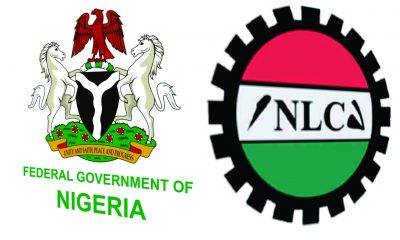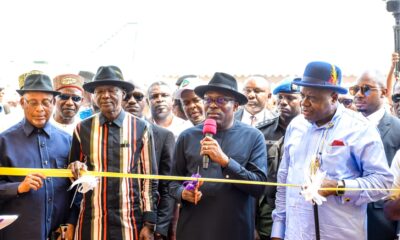Featured
Crisis Of Good Governance In Africa Frustrates Sustainable Dev -Wike …Insists Promotion Of Social, Political Justice’ll Reduce Inequality, Insecurity
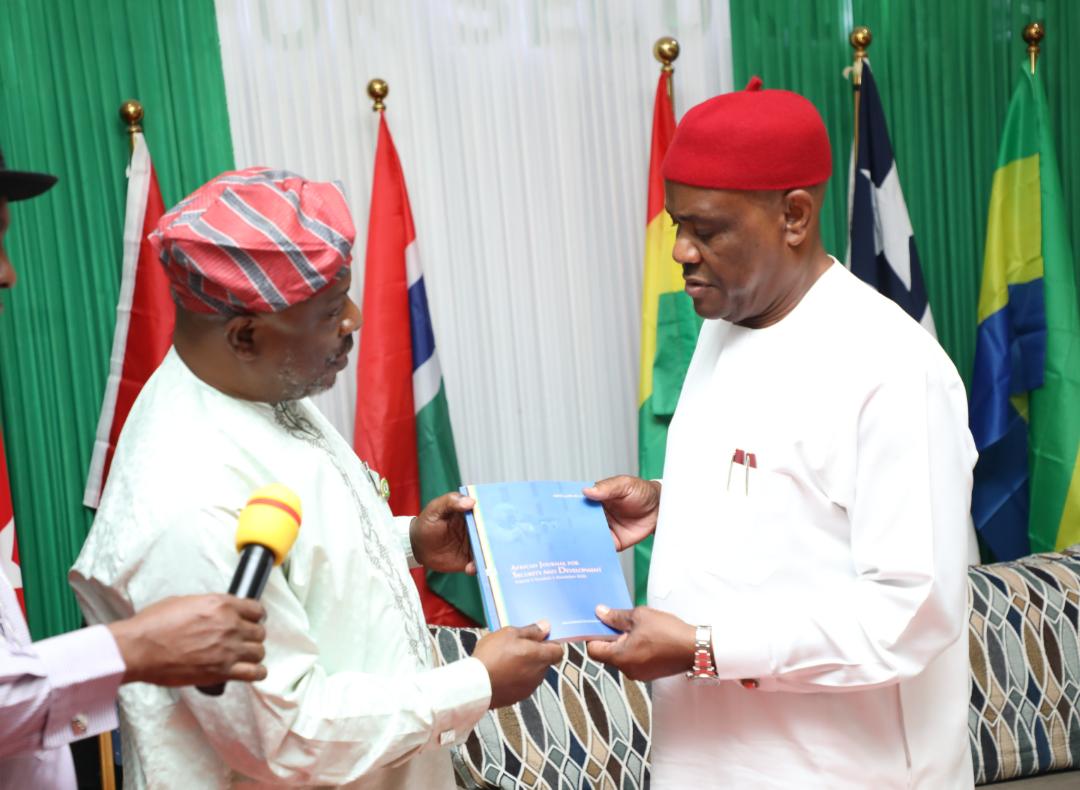
Rivers State Governor, Chief Nyesom Wike, has re-emphasised the need for Nigeria and other African countries to break away from centralised and personalised system of governance in order to achieve enduring development in the continent.
Such sustainable development, he said, would foster economic inclusiveness, offer ethically sound and socially equitable services to every citizenry.
Wike made the assertion while delivering a lecture to the participants of the Executive Intelligence Course Fourteen (EIMC-14), of the National Institute for Security Studies in Abuja, last Wednesday.
The governor spoke on the lecture title: “Governance, Security and Sustainable Development in Africa: Nexus, Challenges and Prospects – the Rivers State Experience.”
The participants were drawn from 24 agencies in Nigeria as well as from countries in West Africa such as Gambia, Ghana and Liberia.
Course participants are officers from the military intelligence, security, para-military, law enforcement, regulatory and other Federal Government strategic agencies.
Wike said if the government system in Nigeria and the rest of Africa was not right, it would be difficult to achieve human security.
Such government, he stated, would continue to struggle under costly civil conflicts that threaten the wellbeing of citizens and the very existence of most Africa countries from within.
The governor wondered why a continent with enormous mineral deposits, large arable land, and favourable climatic conditions has its 1.3billion human population living below poverty line.
Wike said unemployment, especially among the youth, has remained troubling while per capital income, life expectancy, access to healthcare, education, water, housing and social security was abysmally low.
“No African state was able to meet the Millennium Development Goals (MDGs), while the Sustainable Development Goals (SDGs) may equally continue to be shifting targets.
“From a practical point of view, governance is the ability to exercise authority, political or otherwise, within a defined social jurisdiction to manage public resources to advance public interest and meet public needs.
“African states cannot continue to rely on over centralized and personalized forms of government lacking in true democracy, responsiveness, accountability, the rule of law and judicial independence, equity, social justice, and inclusivity and expect to achieve sustainable development.”
According to Wike, sustainable development is a veritable link between development and the environment since it offers an alternative development strategy to improve the living conditions of human population without degrading the environment.
Wike, however, noted that the development path in African has largely been more of disappointments because the majority of the continent’s population was unable to enjoy sustainable access to improved and equitable economic, social, cultural and political conditions.
“This being so, governance is about management and performance; the ability to make and implement decisions and policies to advance social progress and because the expected outcome of governance is to improve human conditions, governance is often seen as the foundation of development.
“However, governance by itself does not guarantee human progress. What does is good governance, which among other things, reflects participation, inclusiveness, responsiveness, effectiveness, accountability, equity, rule of law and respect for human rights.”
Speaking about the governance situation in Nigeria, Wike decried the centralization of power and the lack of fiscal decentralization in the country.
These, he said, have poorly affected the functioning of the sub-national states and local government areas.
“(These have) resulted in poorly functional sub-national states and local government areas, which are largely detracted by resource-dependency, chronic budget shortfalls and institutional limitations to deliver on their responsibilities for economic growth and provision of infrastructure, education, healthcare, employment generation and food security and improve the wellbeing of the citizens.”
Wike pointed out that when he assumed office in 2015, Rivers State was on the verge of bankruptcy, because the government was owing workers’ salaries and contractors for upwards of eight months.
According to him, there was also the lack of effective governance because the state House of Assembly and the courts have been shut for nearly two years.
What that potent, he said, was disregard for the consequences on the rule of law, peace and security including the growth of the state’s economy.
Wike pointed out that his administration has pursued well-defined, people-centred and comprehensive approach that fostered good governance in Rivers State.
Six years into governance, Wike said, his administration has delivered and built a new Rivers State, and addressed the thematic issues of good governance, security and sustainable development to the best of its capability.
“We were perhaps the first state to ensure the practical independence of the Judiciary at the subnational level under the present democratic dispensation.
“We also intervened in providing the necessary conducive environment for both arms (of government) to operate in dignity with modern and comfortable courts to improve access to justice in the state. We also attended to the wellbeing of judicial officers by providing them with official vehicles and life-long accommodation as a matter of legal right.
“Arguably, no government in history has invested as much as our government to rebuild, strengthen and reposition the institutions of governance without which the rule of law, access to justice, protection of human rights and effective governance and delivery of sustainable development cannot be achieved.”
The governor maintained that the Rivers’ economy was stimulated to grow having pragmatically implemented various reforms of economic policies, which have created and opened up the state to trade and investments.
According to him, the debt burden was reduced, a transparent and payer-friendly tax system introduced, and strengthened legal right to property, that included the prompt issuance of certificates of occupancy.
“We also ensured the massive provision of socio-economic infrastructures, including roads and markets to stimulate combination, trade and exchange of goods and services in the state.
“As a result of our efforts, our economy continues to enjoy stronger growth, attracting new investments while the small and medium-sized businesses are on the upsurge creating employment for our people, reducing poverty and generating revenue for the government with which government is funding physical and human capital development to advance sustainable development.”
Wike stated that as a government, his administration has worked to strengthen the transformational power of education that is made available to Rivers youths.
Accordingly, he said, the youths have continued to access knowledge, build skills and values that they need to be imaginative, creative, and be productively competitive and be self-reliant.
Wike said good governance anchored on the rule of law has placed the state ahead of other states in all sectors including making Rivers safer for all residents.
The Deputy Commandant, National Institute for Security Studies, Mr. Dedacos Egbeji, commended Wike for the insightful lecture.
He insisted that for Africa to overcome her security challenges in order to achieve sustainable development, it was imperative for her to embrace good governance in all ramification.
Featured
We Support Rivers Workers To Feel Valued, Productive, Says Fubara …Inaugurates Bayelsa Labour House
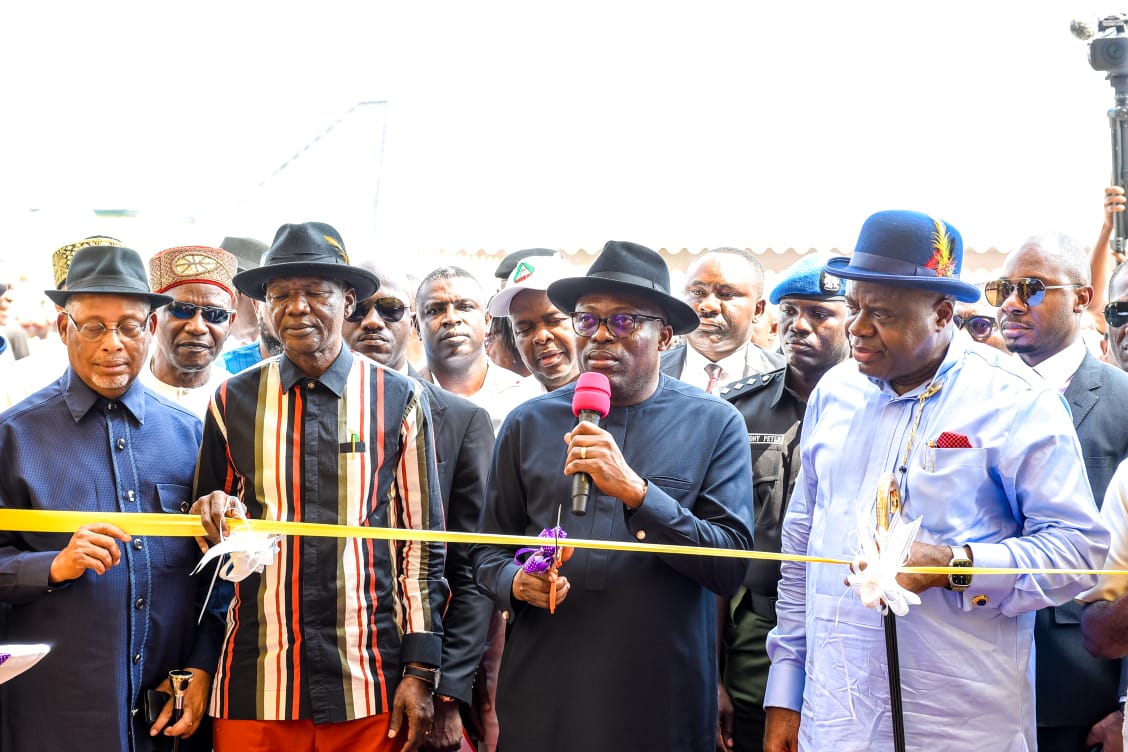
Rivers State Governor, Sir Siminalayi Fubara, has explained that in the heat of political crisis staged against his administration in 2023, he committed to improving the welfare of Rivers workers in order to have a well-motivated workforce to achieve the goals of the Rivers First mantra.
The Governor stated that the resultant industrial harmony has now become unprecedented as workers feel more valued, supported, and resolved to be more productive on an increased efficiency and profitability scale.
Governor Fubara gave the explanation while inaugurating the one-storey twin-building Labour House constructed by the administration of Governor Douye Diri, in Yanagoa City, the Bayelsa State capital, yesterday.
The Governor recalled that while en-route Abuja for a reconciliatory political meeting to find solutions to the 2023 political crisis, his mind kept drifting to what could be done to give hope and cushion the hardship faced by Rivers workers.
Governor Fubara said he made the decision, therefore, to pay Christmas bonus of N100,000 to every worker, across grade levels in December, 2023, and extended the gesture to retirees in 2024.
The Governor stated: “On the 18th of December, the year of Our Lord 2023, I was on my way to Abuja for a reconciliatory meeting, and I was thinking: what will I do for my people – my primary constituency, who are the civil servants?
“We all know that the salary is not enough during the Christmas period. I knew we had a lot of challenges at that time, and it would be difficult for me to do the 13th month.
“But, however, even if I had to do the 13th month, it would also be a cheating to the lower level workers because some of them would have less than N100,000. So, I decided that I was going to do a bonus of N100,000 to all workers. That was my meeting with the Accountant-General while I was on my way to Abuja.”
Governor Fubara said: “After the meeting, I was weakened in my spirit. But on my way back, I said no matter the sadness, I still need to make my people happy.
“And even in the face of that most difficult time of our administration, we made all the civil servants very happy by giving everybody N100, 000 for Christmas that year.”
Governor Fubara pointed to the letter of appreciation written to him by the leaderships of Nigeria Labour Congress (NLC), and the Trade Union Congress (TUC) due principally to the fact that the gesture was extended to all pensioners in 2024, while also seeking to give him an award of recognition.
The Governor stated that what had been done has contributed to the industrial harmony enjoyed in Rivers State, as according to him, every labour issue has also ended on the dialogue table.
Governor Fubara said: “It is not because we are meeting all their needs, but because we are putting human face to governance. We are not running it like Nebuchadnezzar’s time.
“We are not running it like the Babylonians. We are running it with the Jesus style where love takes the lead over everything. Where love is what should be in front and behind.”
Governor Fubara noted that what the Bayelsa State Government has done shows there is good relationship existing between labour and the administration of Senator Diri.
The Rivers State Governor advised the organised labour in Bayelsa State to consider the gesture, not as a right but a privilege so that they can embrace it wholeheartedly, defend, cherish, and protect it, and ensure that nobody comes between them and the government to cause friction.
Governor Fubara also expressed sadness over the demise of Chief Edwin Clark, a leader, he noted, will be remembered for his positive impact on many aspects of national and régional issues.
He said, “We are here, we just observed a minute silence for the death of our hero, Pa Edwin Clark. What is he remembered for? For his courage, truthfulness, doggedness, and the survival of this region.”
Governor Fubara told Senator Diri: “I want you to continue to stand for same thing, and I can see that you are standing for what is right. That is what history will remember you for.
“History will not remember anyone for any destructive thing, don’t deceive yourself. Money and material things cannot be taken for a good name. So, please continue to do what is right. History and the good people of Bayelsa will forever remember you.”
Governor Fubara assured that his administration will promote a robust relationship between Rivers and Bayelsa, unlike what it was 15 years ago, which is why all legal battles hitherto instituted in court have been withdrawn and would be settled out of court.
He added, “That is the first thing to show our commitment that we are in a mutual relationship and ready to make progress. You said it here, Rivers cannot develop without Bayelsa. Bayelsa also cannot make progress without Rivers. That is the truth.”
In his speech, Bayelsa State Governor, Senator Douye Diri, said the project was started by the administration of his predecessor, Senator Seriake Dickson, but quickly added that he has completed it to provide the organised labour in the State a place to conduct their activities, while using it as a platform to voice their concerns, access support services, and engage in constructive dialogue with his administration.
Senator Diri, who commended Governor Fubara for his exemplary labour-friendly policies that have promoted workers’ welfare and industrial harmony, said his administration has so far paid N20billion to servicing pensions and gratuities, hoping to upset all outstanding indebtedness by the end of his second tenure.
In his remarks, Bayelsa State Commissioner for Labour, Employment and Productivity, Mr Odoko Saturday Omiloli, said the magnificent Labour House is a testament of the commitment of the Prosperity Administration of Sen. Diri to promote the welfare and well-being of workers in the state.
In their joint address, both Trade Union Congress (TUC) and Nigeria Labour Congress leaders thanked Governor Diri for building a befitting edifice for them, and pledged to sustain support to his administration.
Featured
Tinubu, Buhari, Others Mourn As Edwin Clark Dies At 97
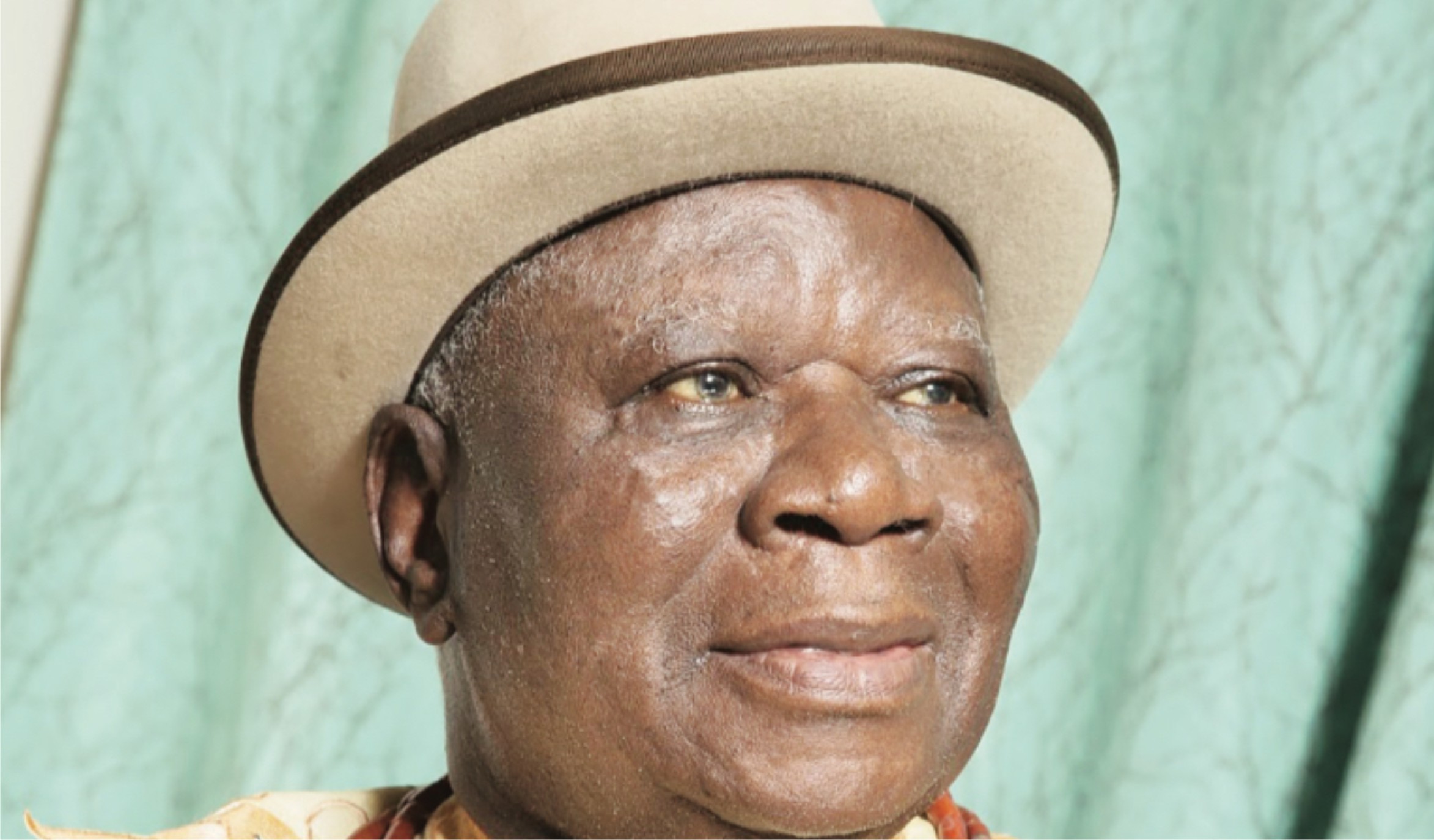
President Bola Tinubu has expressed sadness over the passing of former Federal Commissioner for Information and respected leader of the Pan-Niger Delta Forum, Chief Edwin Clark.
Tinubu’s condolence message was contained in a statement issued by the Special Adviser to the President on Information and Strategy, Bayo Onanuga, yesterday.
Tinubu said, “He led an illustrious life marked by dedicated service, at different times, to the nation and his community as a councillor, state and federal cabinet member.
“He was also a passionate advocate for resource control, economic and environmental justice in the Niger Delta.”
The statement reads: “On behalf of the federal government, the President extends his condolences to the Edwin Clark family, the Ijaw nation, the people of the Niger Delta, and the government of Delta State. President Tinubu mourns Chief Clark and describes his passing as a deeply sobering loss.
“Reflecting on the life of the late statesman, the President says Chief Clark was a towering figure whose influence was felt across Nigeria’s political firmament for nearly six decades. The President states that Chief Clark was a courageous leader who stood for what he believed in and was never afraid to stand alone in the face of injustice.
“Chief Clark spoke for the Niger Delta. He spoke for the nation. His views and interventions on national issues were distinct and patriotic. Pa Clark, a lawyer and educationist, believed in a united Nigeria, and until his last breath, he never stopped reaching out to people from different parts of the country to work together to preserve national unity based on justice and equity.
“As an astute politician, his political opponents never doubted the weight of his words, his confidence, and his conviction when he spoke. Indeed, a patriot has transitioned to the great beyond. History will remember him as a man who fought gallantly for the rights of the people of the Niger Delta, unity in diversity, and true federalism. I know many generations will remain proud of how his efforts contributed to national prosperity and stability.”
Tinubu prayed for divine comfort for Chief Clark’s family, friends, and all those affected by this significant loss.
Clark died on Monday at the age of 97.
His demise was announced by a representative of the family, Prof. C. C. Clark, in a statement Tuesday.
The statement read, “The Clark-Fuludu Bekederemo family of Kiagbodo Town, Delta State, wishes to announce the passing of Chief (Dr.) Sen. Edwin Kiagbodo Clark OFR, CON on Monday, 17th February 2025.
“The family appreciates your prayers at this time. Other details will be announced later by the family.”
Clark’s death is coming on the heels of the passing of Afenifere leader, Pa Ayo Adebanjo, who died at the age of 96 just a few days ago.
Both Clark and Adebanjo are known for contributing to the political development of the country.
Meanwhile, former President Muhammadu Buhari has also mourned Clark, describing him as an iconic statesman.
Buhari, in a condolence statement yesterday, said he death of Clark had caused deep sorrow in his heart and that of many in the country.
The statement read in part: “Late Chief Edwin Clark was a leader dedicated to reforms whose commitment to the development of his community and the nation would always be remembered. His death caused deep sorrow in his heart, and that of many, and his departure was a loss for the nation.
He is an iconic statesman”.
The former president maintained that the late Ijaw leader had left an indelible imprint on the nation and that in his passing, Nigeria had lost an iconic statesman and a distinguished leader.
He added that his commitment to the country’s unity would be respected by generations to come.
Buhari further urged the Clark family and fellow citizens in the Delta region of the country to uphold his numerous achievements.
Also, former Senate President, Bukola Saraki, has described the late PANDEF leader as a man of great conviction.
In a brief message posted via his verified X handle, yesterday, Saraki praised the elder statesman’s unwavering conviction, stating that Clark stood firm in his beliefs until the very end.
“Chief Edwin Kiagbodo Clark was a man of great conviction who stood firm for what he believed in—right to the very end,” Saraki wrote.
He added that Clark’s passionate advocacy for justice and equity would be deeply missed by Nigeria, the Ijaw nation, and the Niger Delta, for whom he was a tireless advocate.
“His death marks the end of an era—an era of principled leadership. He was one of the movers and shakers of the Second Republic Senate, in which my father served as the Leader of the Senate.
“On behalf of my family, I extend our heartfelt condolences to the Clark family, the entire Ijaw community, the people of the Niger Delta, and all Nigerians who mourn the loss of this extraordinary leader,” the former Senate President stated.
A towering figure in Nigerian politics and a relentless advocate for the rights of the Niger Delta, Clark was a lawyer, administrator, nationalist, and freedom fighter.
He served as Commissioner for Education in the Mid-Western Region from 1968 to 1971, and later as Commissioner for Finance and Establishment in the defunct Bendel State between 1972 and 1975.
At the federal level, he was appointed Commissioner for Information in 1975 and subsequently became a Senator from 1979 to 1983.
Beyond his political career, Clark was a leading voice for regional and national unity. He was also known for mediating peace among warring communities and politicians in the Niger Delta region.
Featured
We’re Genuinely Opening Up Kalabari Land For Development, Says Fubara
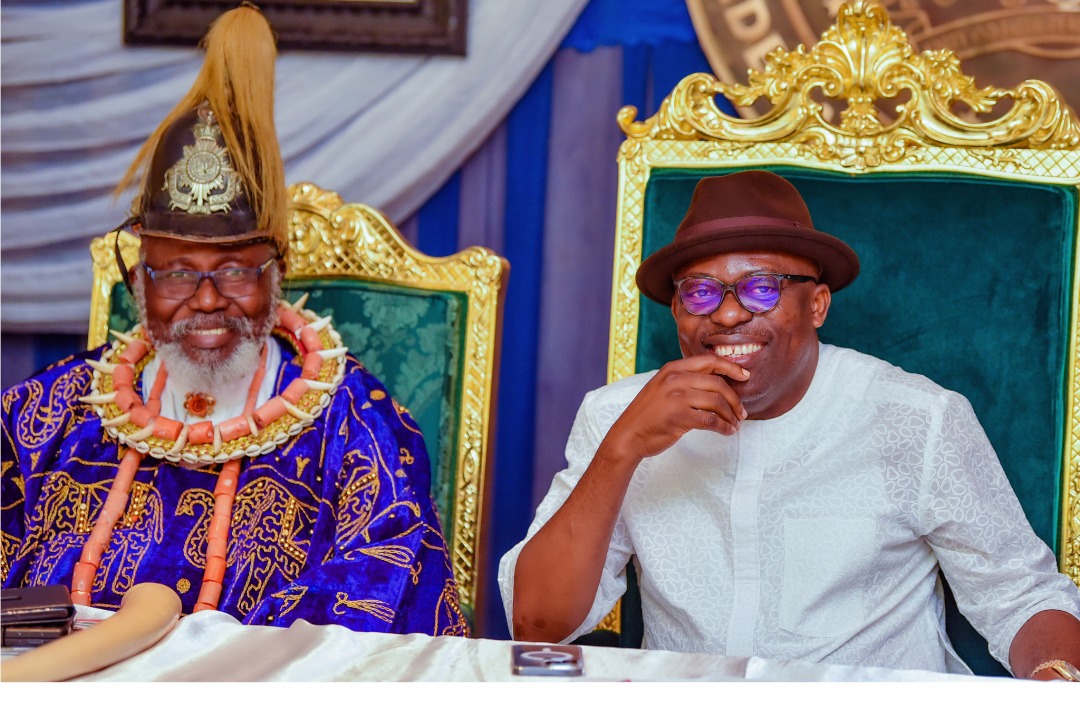
Rivers State Governor, Sir Siminalayi Fubara, has explained that his administration is courageously executing strategic projects that are opening up Kalabari land for unprecedented development and economic growth.
Governor Fubara made the explanation when he received on solidarity visit, a delegation of monarchs, political leaders, elders, women and youths of Kalabari Ethnic Nationality, led by the Amanyanabo of Abonnema, King Disreal Gbobo Bobmanuel, at Banquet Hall of Government House in Port Harcourt, last Tuesday.
The Governor stated that while previous administrations avoided executing the original plan for the Trans-Kalabari Road project due to cost implications, he has ventured into it, and driving the process steadily in order to link Kalabari land to the State capital.
Governor said: “Somebody said, if I don’t do it for my people, who will do it for them. We ventured into the Trans-Kalabari Road, we didn’t close our eyes. Our eyes were open because we knew what we were entering into.
“It is not a joke; it is a big project. We believe that at the end of that project, the level of development that it will attract to that line of entry into Kalabari will be very unprecedented.
“Issues of insecurity from our waterways will be reduced because, at that point we are doing road, people won’t be using the river anymore. The cost of living will also be cheaper.”
Governor Fubara further asserted: “So, you understand that your interest, your safety, your development is key to us. It is not about the number of years that we are going to be here; what is important to this government is the impact we make while we are here.”
Responding to their unanimous endorsement to see him run for a second term in office, Governor Fubara said power belongs to God, and He gives it to whoever finds favour in His sight.
Governor Fubara, however, stated that if God so approved of it, even those who are regrouping against him will not see the path God will lead him because they cannot scuttle such plan.
He added, “Power belongs to God. So, you see, I like believing that we don’t have any problem. When we get to the bridge, we will cross it. If we can break the bridge, Moses will come and create a road for us. So, you don’t need to worry.
“We will cross the bridge. We will cross it in a way that our enemies will be struggling; they won’t see where we are passing. So, don’t worry.”
Governor Fubara acknowledged the immense support to him by Rivers Ijaw, and urged particularly the Kalabari people to stand with honour in their unalloyed support for his administration, which will neither abandon them nor fail to deliver quality projects to the people.
Governor Fubara also responded to their requests and informed them that his administration has completed the Emohua/Tema Junction Road project, and ready to inaugurate the Degema Zonal Hospital in May.
He said the Health Commissioner has been directed to assess the state of the Abonnema General Hospital for immediate rehabilitation, while promising to address the issues of shore protection in the area.
Governor Fubara assured that with the Abonnema sandfilling works completed, the phase two will commence that will include Buguma, explaining that the Commissioner for Works has been tasked to do the assessment immediately.
On the request for the establishment of tertiary institution in the area, Governor Fubara said his administration is already inaudated with memos asking that the off-campus of Rivers State University established previously be revised because it has become difficult to sustain them, but quickly added that the government will consider the establishment of a viable institution that will provide technical and entrepreneurial skills to the people in a sustained manner.
Reading the address of Kalabari Ethnic Nationality, Chief Pawariso Samuel Horsfall, announced that the entire Kalabari people have unanimously endorsed Governor Fubara for a second term, and vowed to mobilise Rivers people to ensure electoral victory for him in the 2027 gubernatorial election.
In his speech, the leader of the delegation and Amanyanabo of Abonnema, King Disreal Gbobo Bobmanuel, expressed the profound thanks of the Kalabari people to Governor Fubara for his genuine love for them, as evidenced in the types and quality of development projects delivered or being executed in the area.


